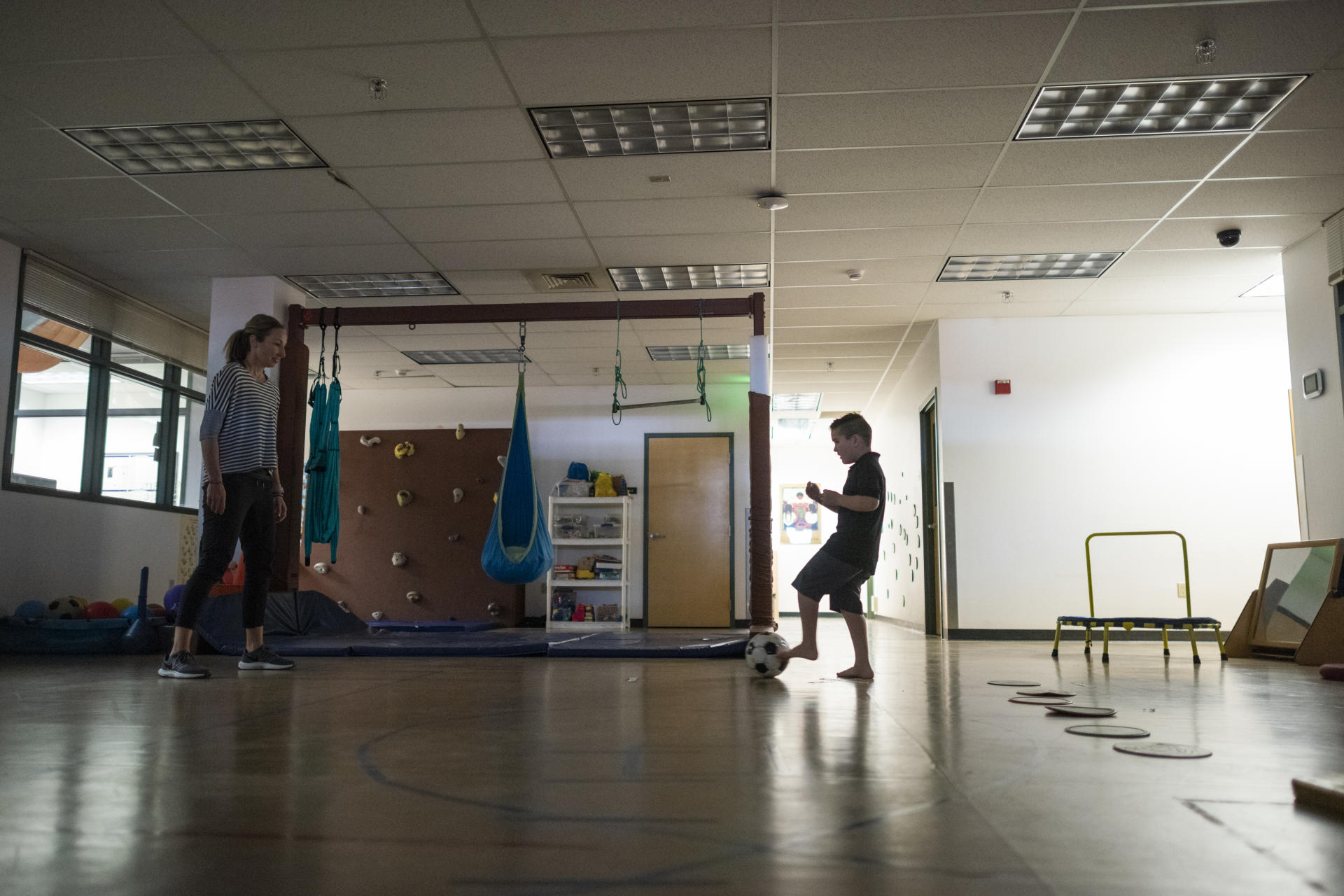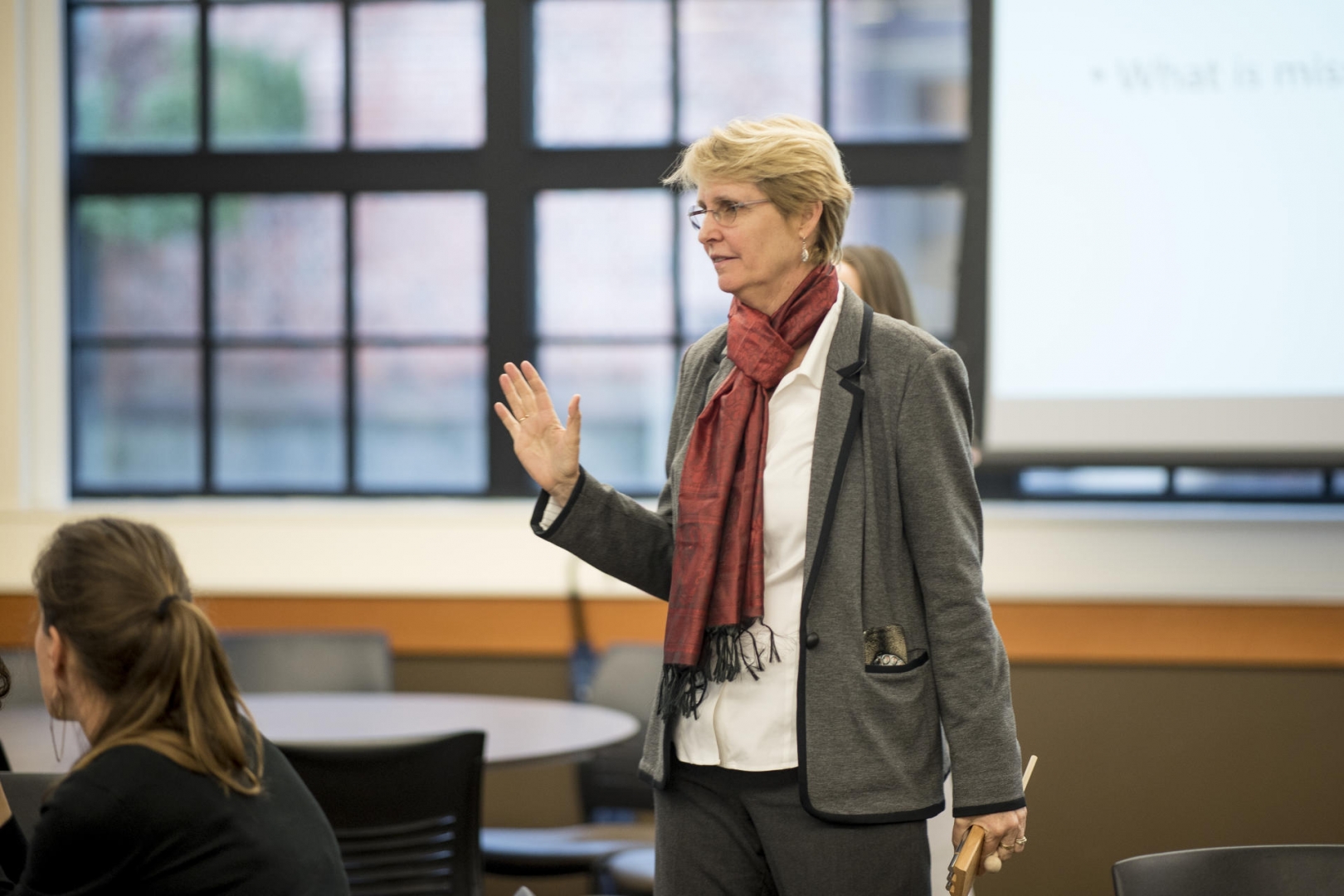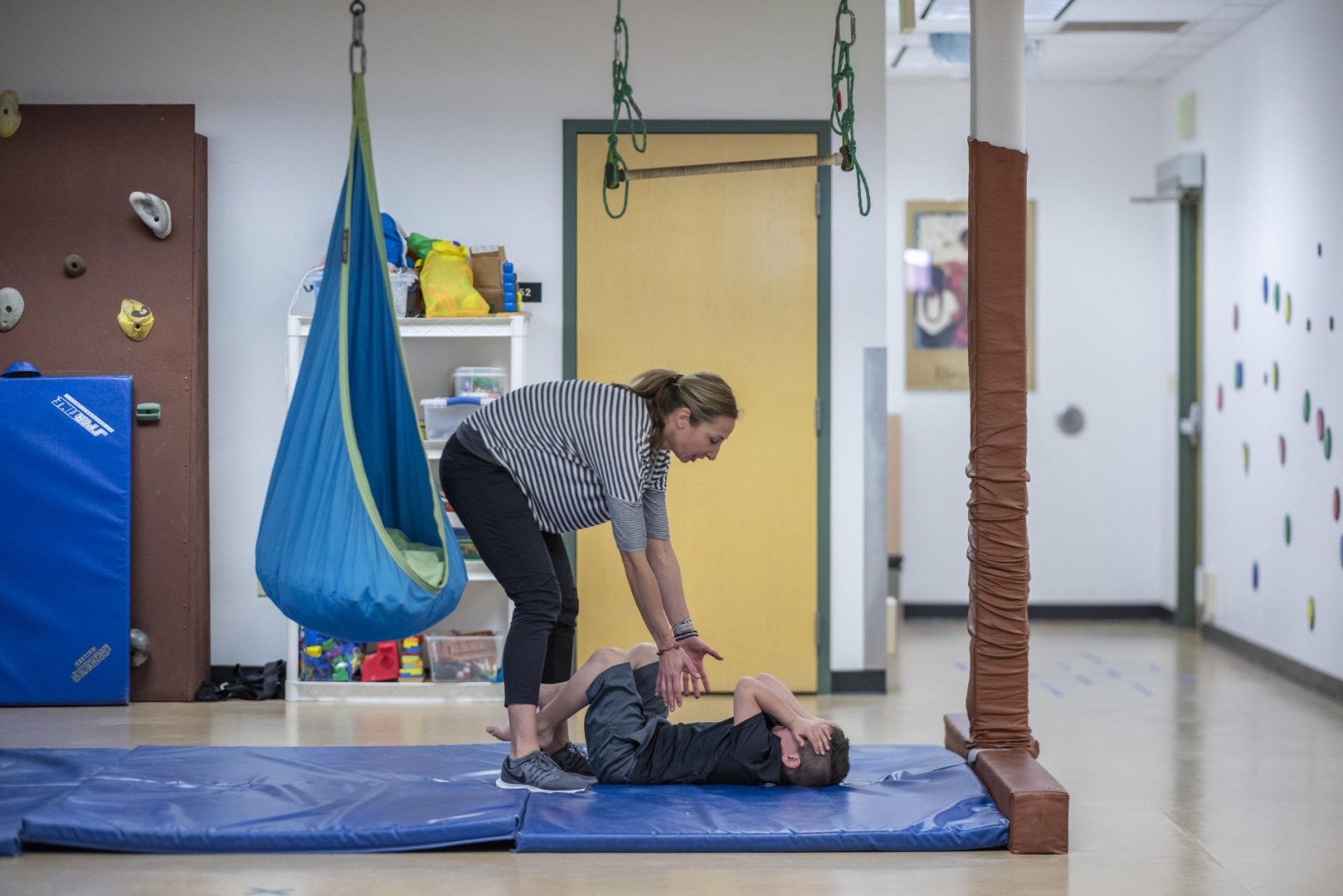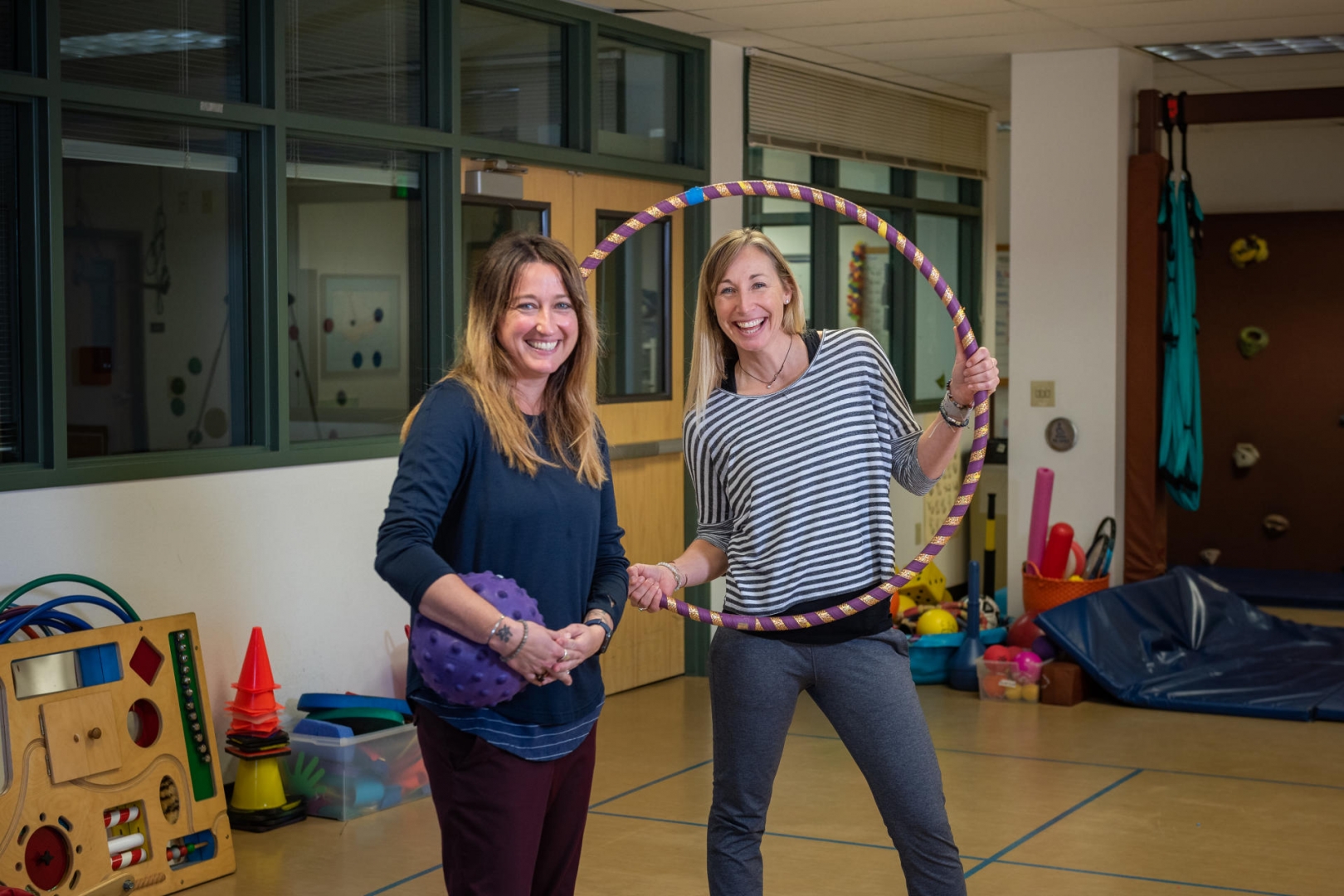Autism Clinic Helps Build Skills for Life

Carli Ross works with Mason Comages, who is autistic, on sensory and motor needs in the Autism Clinic, part of the Kinesiology Department, on Thursday, March 14, 2019 in Chico, Calif. The Autism Clinic promotes the sensory, motor, communicative, and cognitive skills of individuals with autism through a multi-sensory approach to learning. The clinic combines multiple disciplines, resources, and support to allow continuous development in a positive environment for Chico State students, individuals with autism, and their families. (Jason Halley/University Photographer/CSU Chico)
Somewhere between playing catch with a red rubber ball and scaling a six-foot-high climbing wall, seven-year-old Mason Comages decided he’d had enough—and he laid down for emphasis beneath a trapeze swing affixed to the ceiling.
Mason, diagnosed on the autism spectrum, is in the middle of his Autism Motor Clinic session with Carli Ross, a kinesiology lecturer and a clinician at Chico State’s Autism Clinic. As part of the University’s Department of Kinesiology and its Adapted Physical Education (APE) option, the clinic is a service-learning program that pairs clinicians with children who have autism in a personal one-on-one setting.
“Every kid is so different,” said Mason’s mom, Cassy Comages. “What’s so amazing is that the program builds each session specifically for the kid that they’re working with. And they just keep getting pushed and they have goals that they work on.”
Kinesiology faculty Rebecca Lytle started the Autism Clinic inside Yolo Hall in 2003, providing children on the autism spectrum with a safe place to be active and to call their very own—and one designed to maximize learnings.
Since then, Lytle has led the clinic to expand its services to include the Autism Motor Clinic (for children ages 2–13), Teen Group (with a focus on social development and life skills that also includes a food lab element), and PEERS (Program for the Education and Enrichment of Relational Skills) for teens and young adults. While similar centers exist in California and across the country, Lytle—who serves as Autism Clinic and APE coordinator—said they are typically connected with a medical facility of some kind. Chico State’s Autism Clinic is unique in this sense, as it is funded by the Far Northern Regional Center, an agency that serves those with developmental disabilities in nine North State counties.
Lytle said that while the Far Northern Regional Center covers most of the cost to use the Autism Clinic most families, no family is turned away due to cost. Additionally, the clinic accepts donations at its Autism Clinic donation account, which helps to purchase extra equipment and fund summer programming.

(Jessica Bartlett / University Photographer)
From its intimate learning environment to its versatile array of sports equipment, the Autism Clinic is mindful of its setting. Individuals with autism can quickly and easily become overstimulated by sensory input from their environment. As a result, they can have challenges regulating their nervous systems to maintain a comfortable state for optimal learning.
Chico State’s Autism Clinic is a simple, tidy, and wide-open space with lots of room to move freely. The sports equipment ranges from buckets of balls, stacks of Frisbees, and hula hoops to basketball hoops, BOSU balance balls, and a foam pit—every piece with a purpose to help the children gain a better understanding and, eventually, mastery of gross motor skills.
“We work with the kiddos one-on-one for 50 minutes a week on all their big muscles,” said Ross (Kinesiology, ’05; Credential, ’06; MA, Kinesiology, ’11), one of four clinicians on the team that serves approximately 70 families total. “Basically, all the skills you would see at recess or on the playground.”
For children on the spectrum, the schoolyard can resemble a battleground. Whether they’re challenged by time-honored recess activities like throwing and catching or they’re just quiet and socially withdrawn, they can be singled out as being different—negatively impacting their self-esteem and opportunity for growth. The goal of the Autism Clinic’s one-on-one attention is to work on such vexing issues, and once these physical skills improve (or are perfected) the student feels a tremendous sense of pride, which translates into better performance in the classroom, in social settings, and at home.
Comages said it was difficult seeing her son struggle to interact with other children. Mason is nonverbal, he can be aggressive, and his motor skills lag behind his age group. For each session at the Autism Clinic, Ross identifies the activities for Mason, ranging from soccer to basketball to throwing, all in the sensory environment so they serve double duty.
“He could be doing it all on a swing or jumping into the foam pit and catching something,” Ross said. “If we’re doing it in a fun way, he’s still getting those activities in and getting his sensory needs met.”
After nearly five years of working with Ross, Mason has shown remarkable improvement from when he first started, Comages said.

“Just the fact that he’s learned to ride a bike and kick and throw a ball, that really does help him excel and be able to interact with other kids,” she said. “He might not play with them for a long time, but because he has those skills now, he at least can interact.”
While the lessons are structured, there’s plenty of room for flexibility. From the clinician side, planning demands attention to detail, making sure to hit a wide breadth of activities to challenge each child. Those goals extend into confronting potentially stressful situations beyond the elementary school setting to junior high, when structure, responsibilities, and expectations are heightened. Blagrave (Kinesiology, ’05; MA, Kinesiology, ’07) said clinicians sometimes receive physical education class lessons well ahead of time so they can create a teaching plan for the kids.
“We pre-teach the rules ahead of time so they’re not trying to learn them and the skill at the same time,” she said. “This way they can just focus on what the teacher is saying.”
Blagrave recalls working with two girls the summer before their first year in junior high school. The clinicians set up a simulated locker room so the girls could practice opening their locker and changing into their gym clothes for their session. After, they practiced opening the lockers again and changed back into their street clothes.
“We wanted to take that anxiety out of the actual skill part of that so they were comfortable transferring it into a school setting,” Blagrave said.
Another benefit of the Autism Clinic is Chico State’s students partner with the clinicians, help with the lessons, and have these hands-on learning experiences—so the learning experience is mutual. While these students are largely kinesiology majors, Blagrave said the clinic is open to students from all majors.
Senior liberal studies major Amanda Widgay has been working in the Autism Clinic since last spring. From the moment she stepped into a session, she said, she immediately recognized the unique and fulfilling opportunity that was available to her.

“The work is important because it offers support to the kids in areas where they face deficits, including motor skill development, object control, sensory regulation, behavioral skills, and communicative skills,” she said.
Widgay hopes to become a special education teacher after graduation and said the time she’s spent working in the Autism Clinic has been truly gratifying.
“At this point, we have no fewer than 20 or 25 students come through every semester,” Blagrave said. “Multiply that by more than 15 years now that the clinic has been going, and that’s a lot of students we’ve sent out into the world with a really great skill set they didn’t have before.”
The children’s physical and social growth is a result of hard work, dedicated clinicians, and trusting families—and this creates tight, emotional bonds. Much more than just the 50-minute sessions, the Autism Clinic provides a network that understands the emotional highs and lows that accompany autism.
“It’s such a big family and here, even if parents don’t know each other, there’s a shared connection,” Blagrave said. “If you’re a clinic family, everybody looks out for each other and really tries to help everybody get all the information so they can all be successful.”
And as a parent, Cassy appreciates the camaraderie, which, she said, extends far beyond the Autism Clinic.
“It’s not just, ‘Hey, come to therapy and then take your kid home.’ You get that support and that network of people that are always there for you and they link you up with other people that are similar,” she said. “It’s just really neat. It’s a cool community.”


